汉英翻译教程]
- 格式:ppt
- 大小:103.00 KB
- 文档页数:70
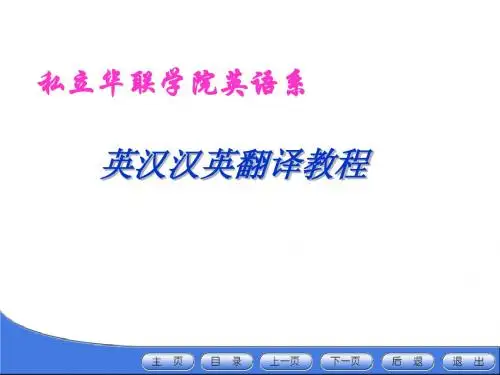
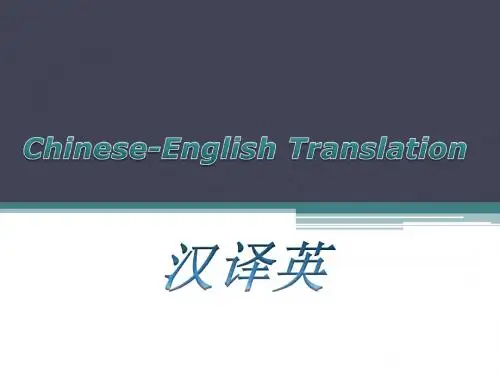
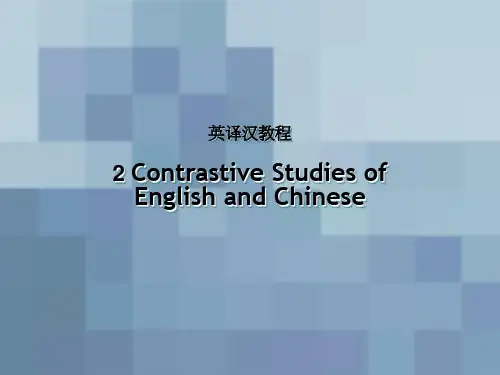
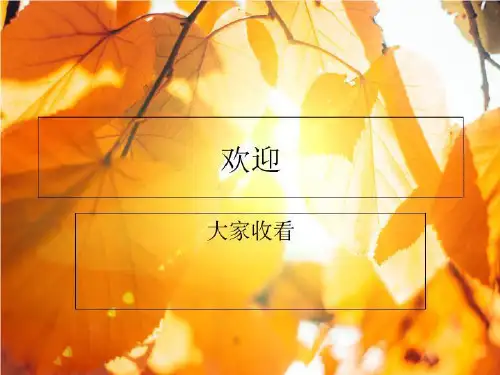
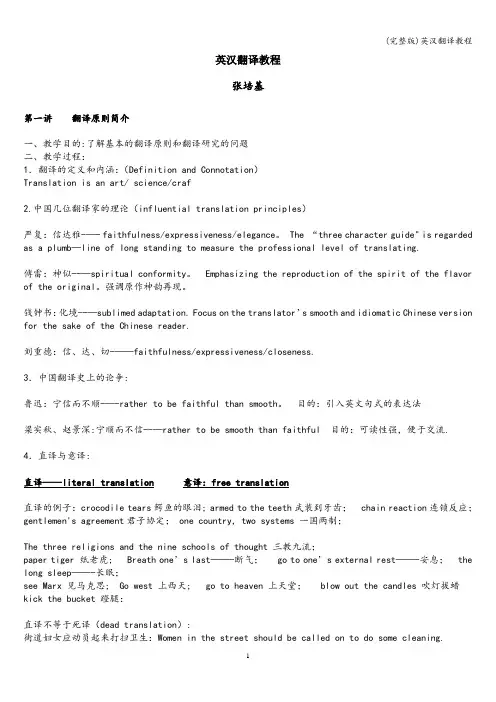
英汉翻译教程张培基第一讲翻译原则简介一、教学目的:了解基本的翻译原则和翻译研究的问题二、教学过程:1.翻译的定义和内涵:(Definition and Connotation)Translation is an art/ science/craf2.中国几位翻译家的理论(influential translation principles)严复:信达雅-—- faithfulness/expressiveness/elegance。
The “three character guide" is regarded as a plumb—line of long standing to measure the professional level of translating.傅雷:神似--—spiritual conformity。
Emphasizing the reproduction of the spirit of the flavor of the original。
强调原作神韵再现。
钱钟书:化境--—sublimed adaptation. Focus on the translator’s smooth and idiomatic Chinese version for the sake of the Chinese reader.刘重德:信、达、切-——faithfulness/expressiveness/closeness.3.中国翻译史上的论争:鲁迅:宁信而不顺-—-rather to be faithful than smooth。
目的:引入英文句式的表达法梁实秋、赵景深:宁顺而不信--—rather to be smooth than faithful 目的:可读性强,便于交流.4.直译与意译:直译—--literal translation意译:free translation直译的例子:crocodile tears鳄鱼的眼泪; armed to the teeth武装到牙齿; chain reaction连锁反应;gentlemen's agreement君子协定; one country, two systems 一国两制;The three religions and the nine schools of thought 三教九流;paper tiger 纸老虎; Breath one’s last——-断气; go to one’s external rest——-安息; the long sleep——-长眠;see Marx 见马克思; Go west 上西天; go to heaven 上天堂; blow out the candles 吹灯拔蜡kick the bucket 蹬腿:直译不等于死译(dead translation):街道妇女应动员起来打扫卫生:Women in the street should be called on to do some cleaning.“In the street" should be replaced by “in the community”.她一大早起床,进城,见到了她的公爹:She got up early, went to the town and saw her public father。
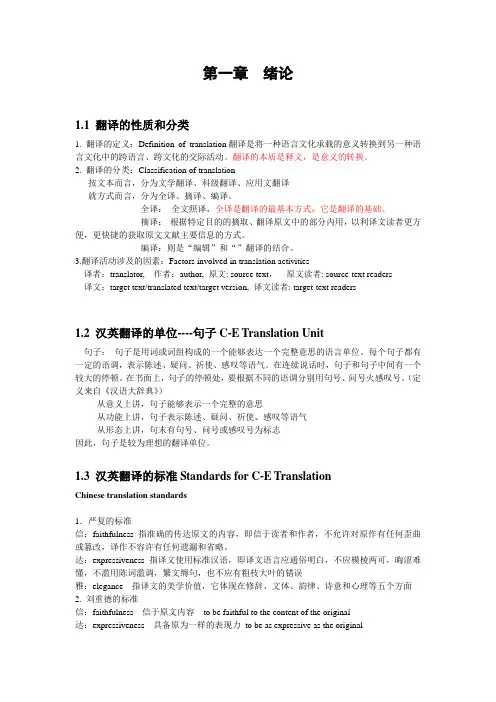
第一章绪论1.1 翻译的性质和分类1. 翻译的定义:Definition of translation翻译是将一种语言文化承载的意义转换到另一种语言文化中的跨语言、跨文化的交际活动。
翻译的本质是释义,是意义的转换。
2. 翻译的分类:Classification of translation按文本而言,分为文学翻译、科级翻译、应用文翻译就方式而言,分为全译、摘译、编译。
全译:全文照译,全译是翻译的最基本方式,它是翻译的基础。
摘译:根据特定目的的摘取、翻译原文中的部分内用,以利译文读者更方便,更快捷的获取原文文献主要信息的方式。
编译:则是“编辑”和“”翻译的结合。
3.翻译活动涉及的因素:Factors involved in translation activities译者:translator, 作者:author, 原文: source text,原文读者: source-text readers译文:target text/translated text/target version, 译文读者: target-text readers1.2 汉英翻译的单位----句子C-E Translation Unit句子:句子是用词或词组构成的一个能够表达一个完整意思的语言单位。
每个句子都有一定的语调,表示陈述、疑问、祈使、感叹等语气。
在连续说话时,句子和句子中间有一个较大的停顿。
在书面上,句子的停顿处,要根据不同的语调分别用句号、问号火感叹号。
(定义来自《汉语大辞典》)从意义上讲,句子能够表示一个完整的意思从功能上讲,句子表示陈述、疑问、祈使、感叹等语气从形态上讲,句末有句号、问号或感叹号为标志因此,句子是较为理想的翻译单位。
1.3 汉英翻译的标准Standards for C-E TranslationChinese translation standards1.严复的标准信:faithfulness 指准确的传达原文的内容,即信于读者和作者,不允许对原作有任何歪曲或篡改,译作不容许有任何遗漏和省略。
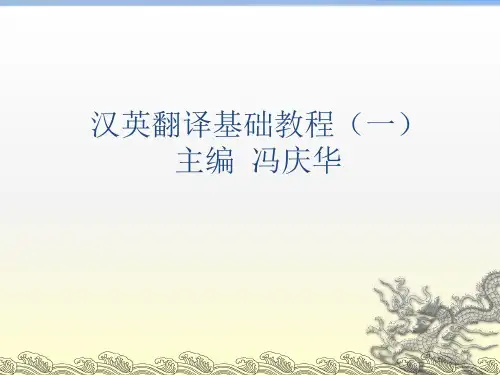

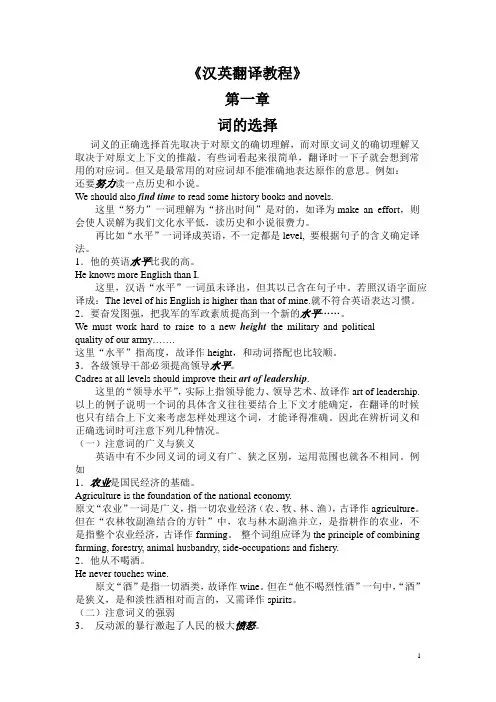
《汉英翻译教程》第一章词的选择词义的正确选择首先取决于对原文的确切理解,而对原文词义的确切理解又取决于对原文上下文的推敲。
有些词看起来很简单,翻译时一下子就会想到常用的对应词。
但又是最常用的对应词却不能准确地表达原作的意思。
例如:还要努力读一点历史和小说。
We should also find time to read some history books and novels.这里“努力”一词理解为“挤出时间”是对的,如译为make an effort,则会使人误解为我们文化水平低,读历史和小说很费力。
再比如“水平”一词译成英语,不一定都是level, 要根据句子的含义确定译法。
1.他的英语水平比我的高。
He knows more English than I.这里,汉语“水平”一词虽未译出,但其以已含在句子中。
若照汉语字面应译成:The level of his English is higher than that of mine.就不符合英语表达习惯。
2.要奋发图强,把我军的军政素质提高到一个新的水平……。
We must work hard to raise to a new height the military and politicalquality of our army…….这里“水平”指高度,故译作height,和动词搭配也比较顺。
3.各级领导干部必须提高领导水平。
Cadres at all levels should improve their art of leadership.这里的“领导水平”,实际上指领导能力、领导艺术、故译作art of leadership. 以上的例子说明一个词的具体含义往往要结合上下文才能确定,在翻译的时候也只有结合上下文来考虑怎样处理这个词,才能译得准确。
因此在辨析词义和正确选词时可注意下列几种情况。
(一)注意词的广义与狭义英语中有不少同义词的词义有广、狭之区别,运用范围也就各不相同。

大学汉英翻译教程(王治奎)1.From English to Chinese (句子)55.I was only joking, but he took it to heart. Just as an old saying goes, “Acasual speaker’s remark may sound deliberate to a suspicious listener.”56.In blaming him for what had happened, you were indeed barking up thewrong tree. He had nothing whatever to do with the affair.57.She is not the kind of person to bear anyone a grudge. She is frank,broad-minded, and outspoken.58.Unique local creations are available in Xi’an, such as the three colored glazedpottery of the Tang Dynasty and terra-cotta figures.59.She couldn’t have come at a better time.60.They preach taking from others, whereas we advocate giving to others. Answers:1.我当时是说着玩儿的,他就认真了。
这不正应了那句话:“言者无心,听者有意”。
2.这件事你责怪他是找错了对象,他与此事毫无关系。
3.她不是那种小心眼儿。
她胸怀宽广、心直口快、光明磊落。
4.到西安你可以买兵马俑、唐三彩。
5.她来得正是时候。
6.他们讲索取,我们讲奉献。
2. From Chinese to English7.缘木求鱼8.大海捞针9.一箭之遥10.守口如瓶11.面如土色12.胆小如鼠13.一模一样14.蠢得像猪15.瓮中之鳖16.倔得像牛17.睡得死沉18.对牛弹琴19.一丘之貉20.掌上明珠21.像落汤鸡22.满腹文章23.聋得像石头24.像没头苍蝇25.无风不起浪26.挂羊头卖狗肉27.聚也不易,散也不易。
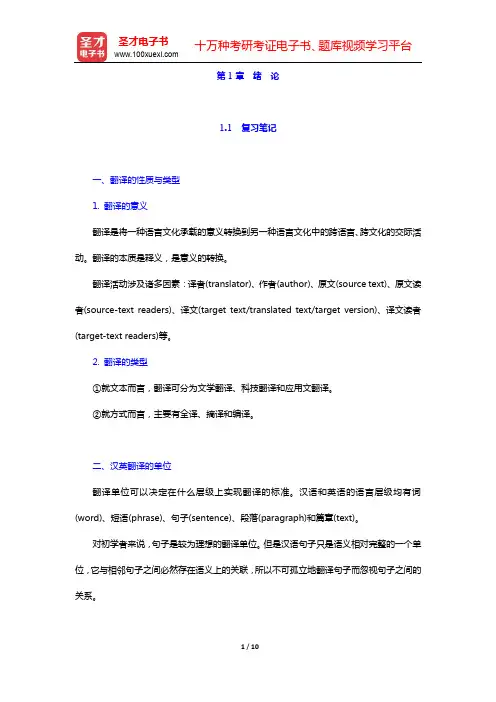
第1章绪论1.1 复习笔记一、翻译的性质与类型1. 翻译的意义翻译是将一种语言文化承载的意义转换到另一种语言文化中的跨语言、跨文化的交际活动。
翻译的本质是释义,是意义的转换。
翻译活动涉及诸多因素:译者(translator)、作者(author)、原文(source text)、原文读者(source-text readers)、译文(target text/translated text/target version)、译文读者(target-text readers)等。
2. 翻译的类型①就文本而言,翻译可分为文学翻译、科技翻译和应用文翻译。
②就方式而言,主要有全译、摘译和编译。
二、汉英翻译的单位翻译单位可以决定在什么层级上实现翻译的标准。
汉语和英语的语言层级均有词(word)、短语(phrase)、句子(sentence)、段落(paragraph)和篇章(text)。
对初学者来说,句子是较为理想的翻译单位。
但是汉语句子只是语义相对完整的一个单位,它与相邻句子之间必然存在语义上的关联,所以不可孤立地翻译句子而忽视句子之间的关系。
三、汉英翻译的标准1. 中国的翻译标准在中国,严复的“信、达、雅”(faithfulness, expressiveness and elegance)是影响最深、流传最广的翻译标准。
该三字标准最早出现于佛经翻译家支谦的《法句经序》中。
文学翻译家黄龙先生对严复提出的翻译标准倍加欣赏,并赋予“信、达、雅”新的内涵和生命,其标准适用于文学翻译。
另一位翻译家刘重德先生在严复的基础上,提出了“信达切”(faithfulness, expressiveness and closeness)的翻译标准。
“信”指信于原文内容(to be faithful to the content of the original);“达”指具备原文一样的表现力(to be as expressive as the original);“切”指尽可能切近原文风格(to be as close to the original style as possible)。
《英汉翻译教程》第一章 总论 翻译是运用一种语言把另一种语言所表达的思维内容准确完整地重新表达出来的语言翻译应当把原文的本意,完全正确的介绍给中国读者,使中国读者得到的概念等于英俄日德法等国的读奈达认为更准确地反映出好的翻译的实际过程是:(1)分析:从语法和语义两方面对原文的信息进行词层不对等的情况 词层不对等采取的策略 对等译法的实例 第二章 词语翻译 相关链接 family的------------------------2009年11月30日阅读 三、修辞引申 “言之无文,行之不远。
”为使译文增色,除了真实地再现原作中包含的内容外We should simplify procedures and take prompt action to import urgently needed technology ( Georges 是他的大臣Cardinal Georges )。
本例背景是美国前国务卿黑格辞职,而由 George Schu Despite their differences , their love will conquer. 尽管他们之间存在着分歧,他们的恋爱1.运用语境 这种手段主要用于语篇上找不到明显的衔接标记,但从意义上来讲是连贯统一的。
接表达出来的语言活动。
(张培基等 1983) 我国早期典籍《周礼·秋官司寇》篇里就有“象胥于英俄日德法等国的读者从原文得来的概念。
(瞿秋白:1931) “动态对等”(Dynamic Equivalence)是奈方面对原文的信息进行分析;(2)传译:译者在脑子里把经过分析的信息从原语转译成译语;(3)重新组织:把相关链接 family的译法: 原文:Do you have a family? 译文1:你有家庭吗? 译文2:你成家了吗? 辨析:现原作中包含的内容外,还得讲究修辞。
这样,在翻译时,往往因修辞需要而增添一些引申意义。
英语(第二版)英汉汉英翻译教程(高职高专英语专业适用)答案1、A good teacher is able to_____a complicated idea in very simple terms. [单选题] *A.put across(正确答案)B.break upC.work outD.bring out2、Study hard, ______ you won’t pass the exam. [单选题] *A. or(正确答案)B. andC. butD. if3、There are trees on both sides of the broad street. [单选题] *A. 干净的B. 狭窄的C. 宽阔的(正确答案)D. 宁静的4、—Why do you call him Mr. Know?—______ he knows almost everything that we want to know.()[单选题] *A. SoB. OrC. ButD. Because(正确答案)5、He always ______ the teacher carefully in class. [单选题] *A. listensB. listens to(正确答案)C. hearsD. hears of6、If the trousers are too long, ask the clerk to bring you a shorter _____. [单选题] *A. suitB.setC.oneD.pair(正确答案)7、59.—Can I talk to the manager?—Please wait ________ minute. [单选题] *A.anB.a(正确答案)C.theD./8、33.Body language is even___________ and ___________ than any other language. [单选题] *A.stronger, loudB.strong, louderC.strong, loudD.stronger, louder (正确答案)9、The little boy saved his money ______ he could buy his mother a gift on Mother’s Day.()[单选题] *A. butB. such thatC. in order toD. so that(正确答案)10、The manager isn’t in at the moment. May I _______ a message? [单选题] *A. take(正确答案)B. makeC. haveD. keep11、—Can you play tennis? —______, but I’m good at football.()[单选题] *A. Yes, I can(正确答案)B. Yes, I doC. No, I can’tD. No, I don’t12、In crowded places like airports and railway stations, you___ take care of your luggage. [单选题] *A. canB. mayC. must(正确答案)D. will13、I didn't hear _____ because there was too much noise where I was sitting. [单选题] *A. what did he sayB. what he had said(正确答案)C. what he was sayingD. what to say14、He’s so careless that he always _______ his school things at home. [单选题] *A. forgetsB. leaves(正确答案)C. putsD. buys15、—Can you play tennis?—______. But I can play basketball.()[单选题] *A. Yes, I canB. Yes, I doC. No. I can’t(正确答案)D. No, I don’t16、Something must be wrong with the girl’s _______. She can’t hear clearly. [单选题] *A. ears(正确答案)B. noseC. armsD. eyes17、This is _________ my father has taught me—to always face difficulties and hope for the best.[单选题] *A. howB. whichC. that(正确答案)D. what18、The plane arrived at London airport _______ Wednesday morning. [单选题] *A. on(正确答案)B. atC. inD. for19、The students _____ outdoors when the visitors arrived. [单选题] *A. were playing(正确答案)B. have playedC. would playD. could play20、—Look at those purple gloves! Are they ______, Mary?—No, they aren’t. ______ are pink. ()[单选题] *A. you; IB. your; MyC. yours; Mine(正确答案)D. you; Me21、Amy and her best friend often ______ books together.()[单选题] *A. read(正确答案)B. readsC. is readingD. to read22、Which is _______ city, Shanghai, Beijing or Chengdu? [单选题] *A. largeB. largerC. largestD. the largest(正确答案)23、_______ win the competition, he practiced a lot. [单选题] *A. BecauseB. In order to(正确答案)C. Thanks toD. In addition to24、Lucy _______ at 7:00 every day. [单选题] *A. go to schoolB. goes to school(正确答案)C. to go to schoolD. went?to?school25、While I _____ the morning paper, a headline caught my eye.. [单选题] *A. have readB. was reading(正确答案)C. had readD. am reading26、My brother is too shy. He _______ speaks in front of lots of people. [单选题] *A. alwaysB. usuallyC. seldom(正确答案)D. sometimes27、—John, How is it going? —______.()[单选题] *A. It’s sunnyB. Thank youC. Well doneD. Not bad(正确答案)28、The three guests come from different _______. [单选题] *A. countryB. countrysC. countryesD. countries(正确答案)29、—Are these your sheep? [单选题] *A)on grass at the foot of the hill.(正确答案)B. feedC.is fedD. is feeding30、The bookstore is far away. You’d better _______ the subway. [单选题] *A. sitB. take(正确答案)C. missD. get。
第5单元I 提示同第4单元II 译法要点5.1不妥的合译 5.2 独立结构: with+复合结构5.3 重新梳理句际关系 5.4 误译:被动句5.5漏译 5.6变通:逗号→破折号5.7呼应:主题 5.8变通:增补(现在完成进行时)5.9 误用:介词 5.10误用:词语5.11变通:分译(单词) 5.12误译:语义逻辑5.13变通:阐释法(II) 5.14 风格:对应式换码5.15历史现在时(I)III 原文与译文【原文】香山红叶(II)听着这个白胡子老人絮絮叨叨谈些离奇的传说,你会觉得香山更富有迷人的神话色彩。
我们不会那么煞风景,偏要说不信。
只是一路上山,怎么连一片红叶也看不见?老人说:“你先别急,一上半山亭,什么都看见了。
”我们上了半山亭,朝东一望,真是一片好景,莽莽苍苍的河北大平原就摆在眼前,烟树深处,正藏着我们的北京城。
也妙,本来也算有点气魄的昆明湖,看起来只像一盆清水。
万寿山,佛香阁,不过是些点缀的盆景。
我们都忘了看红叶。
红叶就在高山头坡上,满眼都是,半黄半红的,倒还有意思。
可惜叶子伤了水,红的又不透。
要是红透了,太阳一照,那颜色该有多浓。
我望着红叶,问:“这是什么树?怎么不大像枫叶?”老向导说:“本来不是枫叶嘛。
这叫红树。
”就指着路边的树,说:“你看看,就是那种树。
”路边的红树叶子还没红,所以我们都没注意。
我走过去摘下一片,叶子是圆的,只有叶脉上微微透出点红意。
我不觉叫:“哎呀!还香呢。
”把叶子送到鼻子上闻了一闻,那叶子发出一股轻微的药香。
另一位同伴也嗅了嗅,叫:“哎呀!是香。
怪不得叫香山。
”老向导也慢慢说:“真是香呢。
我怎么做了四十年向导,早先就没闻见过呢?”我的老大爷,我不十分清楚你过去的身世,但是从你脸上密密的纹路里,猜得出你是个久经风霜的人。
你的心过去是苦的,你怎么能闻到红叶的香味?我也不十分清楚你今天的生活,可是你看,这么大年纪的一位老人,爬起山来不急,也不喘,好像不快,我们可总是落在后边,跟不上。
王治奎,大学汉英翻译教程,山东大学出版社,2006.6●正在热闹哄哄的时节,只见那后台里,又出来一位姑娘,年纪约十八九岁,装束与前一个毫无分别,瓜子脸儿,白净面皮,相貌不过中人以上之姿,只觉得秀而不媚,清而不寒。
(《老残游记》)Admit the feverish bustling, there appeared on the stage a girl about eighteen or nineteen years old, dressed up just like the former. Her face was shaped like melon-seed. Her beauty was above the average woman---charming but not coquettish, and a charity of complexion but not coldness. (p. 8)●老栓正在专心走路,忽然吃了一惊,远远的看见一条丁字街,明明白白横着。
他便退了几步,寻到一家关着门的铺子,蹩进檐下,靠门停住了。
(鲁迅《药》)Absorbed in his walking, Old Shuan was startled when he saw the crossroad lying distantly ahead of him. He walked back a few steps to stand under the eaves of a shop in front of its closed door. (11)●老王和我算是柳家大院最“文明”的人了。
“文明”是三孙子。
(老舍《柳家大院》)OldWang and I are considered the genteel folks in the compound. Gentility be hanged! (Gentility be blowed! Gentility, the deuce take it!) (33)●现在我在街上摆卦摊儿;好了呢,一天也抓弄个三毛五毛的。